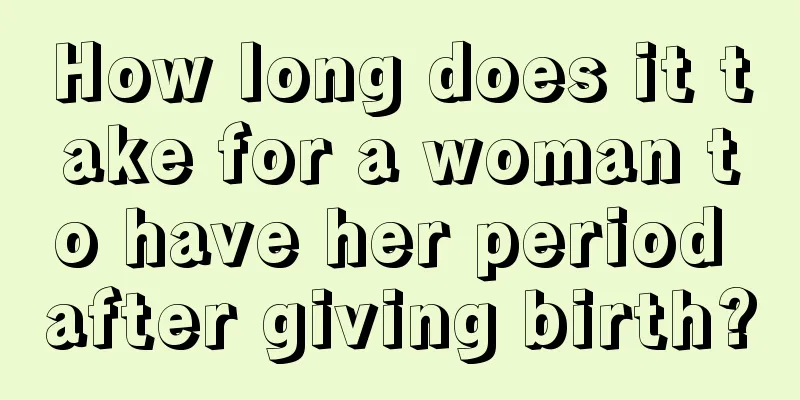How long does it take for a woman to have her period after giving birth?

|
After giving birth, women should choose simple foods in their diet and avoid eating complex foods. Also, during the confinement period after giving birth, women must avoid cold foods and avoid catching cold, otherwise it will affect their health. How long does it take for a woman to have her period after giving birth? This is something many women don't know. The following is a detailed introduction so that you can have some understanding. How long does it take for a woman to have her period after giving birth? From a medical point of view, based on the tissue morphology of the endometrium, the ovaries may be able to ovulate as early as 33-42 days after delivery. In addition, the presence of a corpus luteum after ovulation can also be observed 6 weeks after delivery. Therefore, if the mother does not breastfeed, menstruation usually comes within 6 to 8 weeks after delivery. Research data show that 40% of non-breastfeeding mothers resume ovulation 6 weeks after delivery; by 8-12 weeks after delivery, only about 35% of mothers have not resumed ovulation and menstruation. About 25% of breastfeeding mothers will resume ovulation and menstruation 12 weeks after delivery, and most breastfeeding mothers usually take until 18 weeks to fully resume ovulation function. However, it is sometimes difficult to clinically determine the exact time of the first menstrual period after delivery, and a small number of women will begin to have intermittent bleeding of small to moderate amounts immediately after delivery. Breastfeeding mother's menstruation For new mothers who breastfeed their babies, ovulation and menstruation will resume later, and some may not have their period until a year later. For most people, their first menstrual period is heavier than usual, but their second period becomes normal, so no treatment is needed. When menstruation comes, the amount of milk a breastfeeding mother produces generally decreases, and the quality of the protein and fat in the breast milk also changes slightly, with the protein content being higher and the fat content being lower. This milk sometimes causes indigestion symptoms in babies, but this is a temporary phenomenon and will return to normal after the menstrual period. Therefore, mothers do not need to stop breastfeeding whether during or after menstruation. After understanding how long it takes a woman to have her period after giving birth, if she has not had her period after giving birth, she should have a physical examination in time. This way, she will have some understanding of her specific situation and be able to choose the correct method when it comes to alleviating the symptoms. Women should also pay attention to this. |
<<: How long does it take to get menstruation after giving birth?
>>: What causes right lower abdominal pain in early pregnancy?
Recommend
What are the nutritional components of Hami melon? Why does the skin of Hami melon have stripes?
The melon has various shapes and unique flavors. ...
How long does it take for the fertilized egg to bleed?
Implantation bleeding refers to the appearance of...
Treatment of nonspecific urethritis and gonococcal urethritis
Nonspecific urethritis and gonococcal urethritis ...
The role of gynecological Daconin suppository
The main function and effect of Daktarin supposit...
Uric acid accelerates kidney damage, especially these 5 types of people need early prevention and treatment!
1. High-purine diet lovers This group of people e...
What foods can help breast enlargement?
Some people never know that when we want to enlar...
What is the reason for milk discharge from the areola
The nipple is the most sensitive and fragile area...
What to eat for postpartum sweating? Five recipes for you to choose from
Female friends are more likely to experience swea...
Can pregnancy test stick detect it in ten days?
Many people are accustomed to using pregnancy tes...
Illustration of mole on the right side of a woman's mouth
Moles are something on our human body. Almost all...
Why do I get constipated when my period comes?
Why do I get constipated when my period comes? Ma...
What happens if menstruation is delayed and irregular?
Menstruation is something that all of us women ha...
What causes pregnancy-induced hypertension?
How is pregnancy-induced hypertension caused? Wom...
7 tips to keep your vagina youthful
Aging will not only age your face, but will also ...
When can I plant forget-me-not seeds? How long does it take for forget-me-not seeds to germinate?
Forget-me-not is a blue-purple flower plant that ...









